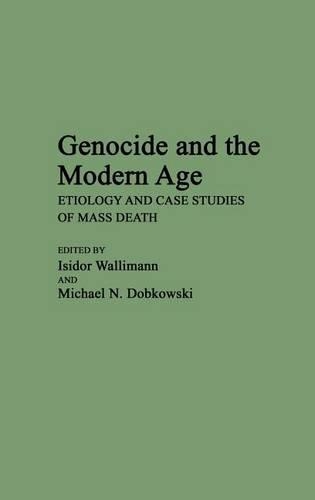
Genocide and the Modern Age: Etiology and Case Studies of Mass Death
(Hardback)
Publishing Details
Genocide and the Modern Age: Etiology and Case Studies of Mass Death
By (Author) Michael Dobkowski
By (author) Isidor Wallimann
Bloomsbury Publishing PLC
Praeger Publishers Inc
13th January 1987
United States
Classifications
Tertiary Education
Non Fiction
Second World War
European history
909.82
Physical Properties
Hardback
340
Reviews
"The 13 original essays in this collection constitute a valuable addition to the large and still-growing literature on genocide. They deal with old but still unresolved issues as well as new ones, including problems of conceptualization, methodology, and theoretical interpretation. Standard concepts of genocide are reexamined and comparisons are drawn with related phenomena of mass destruction, such as total war." Further refinements are offered in the form of new typologies of genocide. Most provocative and important of all, new theoretical perspectives and schemes of interpretation are presented. Although the essays, as might be expected, give special attention to the Holocaust, they also provide case studies of the Armenian and Australian-Aboriginal instances, as well as a consideration of numerous others. The collection is enhanced by an excellent introduction and afterword. It is supplemented by a very useful selective annotated bibliography of the more important works on the problem of genocide, and an excellent index. Highly recommended for public and academic libraries, community college level and up.-Choice
This volume is a welcome and urgently needed systematic social science approach to understanding genocide and the Holocaust--a field that is sadly understudied. The thirteen chapters and an introduction by the editors, as well as the afterword by Richard Rubenstein, dovetail well together. The chapters are represented by experts from several social science disciplines and from theology and philosophy. The book is divided into two sections; the first deals with definitions, typologies, and an explanation of the causes of genocide. The second section concerns itself with special aspects of genocide including the Holocaust, the Armenian genocide, the destruction of Australian Aborigines and total war. Each author addresses an urgent topic which cumulatively advances our understanding of this extreme form of human behavior.... This short scholarly volume is a well written work on a painful topic of destructive human behavior. As someone who has taught courses on genocide for twelve years and is familiar with the existing literature, I would say that this book adds an updated theoretical perspective which attempts to account for genocide from a multidisciplinary perspective. It is devoid of jargon and can be read and understood by an educated readership it is especially suited for undergraduate and graduate college students and people who are interested in peace, war, genocide, the Holocaust and the nuclear threat. It could be very useful in sociology, anthropology, political science and history courses.-International Journal of Comparative Sociology
""The 13 original essays in this collection constitute a valuable addition to the large and still-growing literature on genocide. They deal with old but still unresolved issues as well as new ones, including problems of conceptualization, methodology, and theoretical interpretation. Standard concepts of genocide are reexamined and comparisons are drawn with related phenomena of mass destruction, such as total war." Further refinements are offered in the form of new typologies of genocide. Most provocative and important of all, new theoretical perspectives and schemes of interpretation are presented. Although the essays, as might be expected, give special attention to the Holocaust, they also provide case studies of the Armenian and Australian-Aboriginal instances, as well as a consideration of numerous others. The collection is enhanced by an excellent introduction and afterword. It is supplemented by a very useful selective annotated bibliography of the more important works on the problem of genocide, and an excellent index. Highly recommended for public and academic libraries, community college level and up."-Choice
"This volume is a welcome and urgently needed systematic social science approach to understanding genocide and the Holocaust--a field that is sadly understudied. The thirteen chapters and an introduction by the editors, as well as the afterword by Richard Rubenstein, dovetail well together. The chapters are represented by experts from several social science disciplines and from theology and philosophy. The book is divided into two sections; the first deals with definitions, typologies, and an explanation of the causes of genocide. The second section concerns itself with special aspects of genocide including the Holocaust, the Armenian genocide, the destruction of Australian Aborigines and total war. Each author addresses an urgent topic which cumulatively advances our understanding of this extreme form of human behavior.... This short scholarly volume is a well written work on a painful topic of destructive human behavior. As someone who has taught courses on genocide for twelve years and is familiar with the existing literature, I would say that this book adds an updated theoretical perspective which attempts to account for genocide from a multidisciplinary perspective. It is devoid of jargon and can be read and understood by an educated readership it is especially suited for undergraduate and graduate college students and people who are interested in peace, war, genocide, the Holocaust and the nuclear threat. It could be very useful in sociology, anthropology, political science and history courses."-International Journal of Comparative Sociology
Author Bio
ISIDOR WALLIMANN is Lecturer in sociology at the School of Social Work in Basel, Switzerland. MICHAEL N. DOBKOWSKI is Associate Professor of Religious Studies at Hobart and William Smith Colleges.
